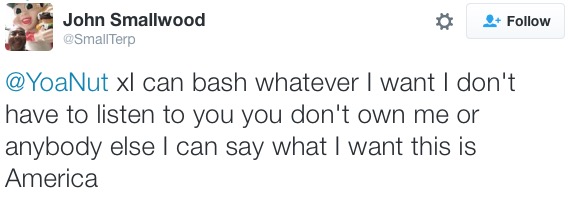Ad Disclosure
John Smallwood Wants the Sixers to Be Relegated to the D-league
By Kyle Scott
Published:

I’ve joined in the long line of chucklefucks to engage in a Twitter argument with Jonathan H. Smallwood, who has the argumentative skills of a child whose basic motivation is a cookie. Jonetah, it seems, still can’t comprehend that the Sixers’ plan – with all of its faults – was to be bad, stockpile young talent, and then build a team around the young talent once they’re all in a position to succeed. They’re somewhere between steps two and three now. With Joel Embiid still on a minutes restriction, Jahlil Okafor just coming off his, Nerlens Noel injured, Ben Simmons also injured, and Dario Saric just assimilating into a society where a coup isn’t imminent (yet), the Sixers are still 2-3 years away from being a solid contender. And yet, Smallwood still employs an anti-Process argument that amounts to they’re not good now and therefore it will never work. Smallwood is not very intelligent, a fact he proved once again in this mind-numbing column today calling for the Sixers to be relegated to the D-leauge in much the same way underperforming English Premier League teams are kicked down a level:
There is a huge financial hit for dropping from the Premier League to the second-tier Championship League. In television revenue only, each of the 20 Premier League teams is guaranteed 100 million pounds. Television money for the Championship League is around 3 million pounds per team.
With that kind of cash at stake, it is no wonder Pardew is on the hot seat. Last week, Harris and David Blitzer, a Sixers partial owner and Crystal Palace investor, reportedly met with Palace chairman Steve Parish to discuss Pardew.
Perhaps if the NBA had a relegation system and the Sixers were actually sent to the D-League for having stocked a roster of D-League quality designed to lose, Brown would be under that kind of pressure from Harris to get things turned around, too.
Oy.
I actually agree that all of the four major US sports should have a relegation system, but there are two fundamental problems with Smallwood’s take: 1) the D-league is a minor league for the NBA, and the Sixers actually own a D-league team, a much different structure than what goes on in English soccer, and 2) Smallwood is not suggesting a solution to make sports better, he’s searching for an easy crutch to spread his anti-tank shit. A column needed to be written today, dammit, and I’m all out of options– I know, soccer analogy!
Worse than his silly trope is his continued inability to comprehend the basic structure of the tank and the fact that the Sixers’ record now matters little in the grand scheme of things and it’s essentially pointless to surround raw or injured rookies with win-now veterans at this stage in the process:
Former Sixers president/general manager Sam Hinkie may have been the architect of “The Process,” but he did not have the authority to act autonomously.
Had Harris not been in favor of the idea of intentionally losing in order to gain high draft picks, Hinkie would have walked a different path in rebuilding the Sixers.
You can speculate on whether it was at the directive of the other NBA owners, but last December Harris, in a surprising change of heart, cut Hinkie’s legs out from under him by hiring Jerry Colangelo as chairman of basketball operations.
Near the end of the season, Bryan Colangelo was brought in to drive the car and Hinkie quit rather than slide over to the passenger’s seat.
But how much has changed?
The two-season wait for rookie center Joel Embiid has exceeded expectations and the drafting of Ben Simmons with the No. 1 overall pick brings more hope.
Still, Colangelo’s free-agent signings of Jerryd Bayless, Gerald Henderson and Sergio Rodriguez were not dial movers. And considering the assets Hinkie left in the cupboard to play with, Colangelo’s inability to move back up into the lottery and draft another talented young player was a passive decision when aggression was needed.
But what happened to the MAN OF ACTION the Inquirer wrote about prior to the draft? Smallwood contradicts himself at every twist, at one point arguing in favor of win-now, and a sentence later pleading with the family Colangelo to trade away assets for lottery picks, which was actually a central tenant of Hinkie’s plan. John no understand that. This is a bad column and John Smallwood is a bad columnist.
Kyle Scott is the founder and editor of CrossingBroad.com. He has written for CBS Philly and Philly Voice, and been a panelist or contributor on NBC Sports Philly, FOX 29 and SNY TV, as well as a recurring guest on 97.5 The Fanatic, 94 WIP, 106.7 The Fan and other stations. He has more than 10 years experience running digital media properties and in online advertising and marketing.